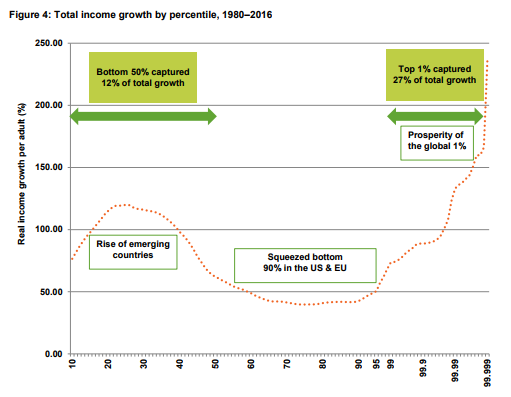The wealthy have been doing rather well but what about the bottom 50%?
As the global elite gather in Davos, Oxfam's Deputy Head of Research Deborah Hardoon sets out some stark facts on inequality from Oxfam's new report, Reward Work, Not Wealth.
The wealthy have been doing rather well but what about the bottom 50%?
Gotta love a data release. Every year I look forward to the release of the Credit Suisse Global Wealth databook. An immense piece of work, developed over a decade and led by Anthony Shorrocks, which brings together all available data on household wealth within countries all over the world. It tells us how much wealth there is, and where it is. This year, by incorporating historical data sets too, we can better understand how the household wealth distribution has been changing over time.
The dataset gives us some pretty startling headline findings.
- Global net wealth continues to grow. Since 2000 net wealth has increased by approximately $114 trillion in real terms, to a whopping $280 trillion.
- US wealth dwarfs that of any other country, standing at $93 trillion. Chinese wealth has increased by more than 300% over this period to $29 trillion, making it the second wealthiest country in the world. In Africa, where there are 200million more people than China, total wealth stands at just $2.5tr.
- The richest 1% in the world have more wealth than everyone else put together.
- Total wealth increased by more than $9 trillion between 2016 to 2017, of which 82% went straight to the richest 1%. The bottom 50% saw no increase in net wealth over this period.
Oxfam’s report ‘Reward work not wealth’, out today, looks at these statistics and analyses what this means for people. It headlines on this last bullet point: last year, for every $5 of wealth created, $4 went to the already wealthy. So what does this look like for different people around the world?
Well, the wealthy have been doing rather well. Billionaires in particular, 90% of whom are male and many of whom will be gathering at Davos this week, will be happy to have seen their wealth accumulate off the back of ‘an epic year for stocks’. As the economy grows, wealthy asset owners have been receiving an ever-increasing slice of this pie, as measured by the trend of the increasing capital (declining labour) share of GDP. Other evidence suggests that monopoly power and inheritance help keep the wealthy in good times. Many of these billionaires will be shaking each others’ Rolex-flanked hands in the mountains of Davos this week and discussing the very economy that has helped them sustain and grow their nest eggs.
What about the bottom 50%? The bottom 50% saw no increase in net wealth in the last year. None. For many, hard work is not proving to be the ticket to prosperity. In developing countries the number of people working but in poverty is now on the rise. Precarious and low paid work, unpaid care work and discriminatory and abusive workplaces are the norm for hundreds of millions of people around the world. Women face multiple barriers, being paid less than men, more likely to experience violence in the work place and more likely to be responsible for unpaid care responsibilities. In unpacking wage inequalities and shining a light on the working poor, through telling personal stories of exploitation, [such as that of Dolores, who works in a chicken factory in the US but wears a nappy because she is unable to take sufficient toilet breaks], the report paints a very different picture of the state of the economy and how people are rewarded for their contribution.

Even as we celebrate the ongoing decline in extreme poverty around the world, it’s also clear that the global economy could do far better for people living in poverty and particularly for working women. So the report asks the reader, which will hopefully include those people gathering in Davos, to consider an alternative. What if there were rules in place that meant that companies couldn’t pay out enormous CEO salaries and dividends to shareholders until all their employees were paid a living wage? What if alternative business models were incentivised, which give workers an ownership stake in the company and/or a say in the way it operates and distributes rewards? What if poverty wages were eliminated, with minimum wages set at a level that allows a decent standard of living and an end to discriminatory practices, allowing working families to save and invest. What if extreme wealth could be effectively taxed, ending the holidays and havens enjoyed by the wealthiest. And what if the revenue was used to invest in health and education, cutting down the barriers people face in trying to escape poverty?
Deborah Hardoon is Oxfam’s Deputy Head of Research. She can be followed on Twitter @DeborahHardoon.
This article was originally published on Oxfam’s website and is republished here with permission.
Leave a Reply
Leave a Reply